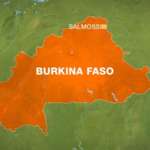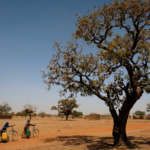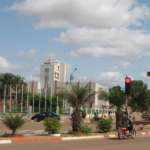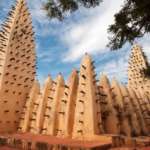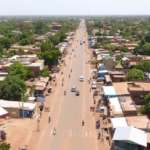A Closer Look at Burkina Faso
Burkina Faso Flag

Burkina Faso Formation Date
Burkina Faso gained independence from France on August 5, 1960.
Burkina Faso Capital Name
? Ouagadougou
Burkina Faso Neighbours
Exploring Burkina Faso
The Origin of Burkina Faso
Burkina Faso, formerly known as Upper Volta, was originally colonized by the French in 1896, though the region has a history spanning much further back. Two of the major pre-colonial Kingdoms in the area were the Mossi Empire and the Tagarâ Kingdom. The Mossi Empire developed the most advanced form of organized society in what is now Burkina Faso, and was distinguished by its complex political, social, and religious hierarchies. French colonization of the region after 1896 was both economic and cultural, though France was the only European power to take direct control of the area. The French administered the new colony by dividing the land into districts (cercles) and using men from the city of Ouagadougou to help rule the newly formed territories. The French continued to rule over the region until its independence in 1960, when it was renamed the Republic of Upper Volta.Culture of Burkina Faso
Burkina Faso is a diverse nation that is composed of more than 60 ethnic groups. The largest and most influential group is the Mossi people, which make up about half of the population. Islam is the primary religion in Burkina Faso, and it has been a major influence in the nation’s arts, music, and literature. The country also has a vibrant culture of traditional music and dance, and some of the major music styles include hip hop, reggae, African jazz, makoussa, and Zoblazo. Traditionally, the country has also been known for its artisans, who craft all sorts of items from leather, wood, stone, and other materials.Sports in Burkina Faso
Football (soccer) is the most popular sport in Burkina Faso. It is played on both the amateur and professional levels, and national and international tournaments are held periodically. Basketball is also quite popular, particularly among youth, as is handball. Rugby and tennis are also played, though to a lesser extent. Burkina Faso also has a strong tradition of martial arts, including Dambe (known internationally as ‘leather boxing’).Religion in Burkina Faso
Islam is the dominant religion in Burkina Faso, practiced by over half of the population. Christianity is the second most-practiced religion, followed by traditional African beliefs (animism and witchcraft). freedom of Religion is constitutionally protected, and other religions are allowed to be practiced as long as it is done in accordance with the law and with respect for other religions.Languages of Burkina Faso
French is the official language of Burkina Faso, but many native languages are also spoken in the country. The main native languages of Burkina Faso are Fulfulde, Moré, Mandinka, and Dagursi. Additionally, peul, Lobi, and Dioula are also spoken in some areas of the country.Education in Burkina Faso
Education in Burkina Faso is offered at both the primary and secondary levels and is free and compulsory for children between the ages of 6 and 16. Primary education consists of six years of study and is followed by a three-year cycle of lower secondary school. Literacy rates among adults in Burkina Faso are estimated to be as low as 26.4%, especially in rural areas. Efforts have been made by the government to increase access to education and improve the quality of the education system.Demographics of Burkina Faso
Burkina Faso is a landlocked, mostly rural country located in West Africa. As of 2019, the population of Burkina Faso is estimated to be around 20 million. The population is very youthful, with over half of the population aged 14 or younger. Life expectancy is relatively low at 59.5 years for the total population, and the overall fertility rate is 5.3 children per woman.Commerce in Burkina Faso
Burkina Faso is largely dependent upon agriculture for its economic growth. Cotton, cereals, sorghum, millet, corn, and peanuts are some of the major crops that are produced. The main exports of Burkina Faso include cotton, gold, and livestock. The country also has an active tourism sector, which provides additional revenue and employment opportunities.Weather in Burkina Faso
The climate in Burkina Faso varies across the country, with the northern parts having a sub-Saharan climate and the southern parts having a tropical savanna climate. The more northerly regions experience hot, dry, and dusty conditions, with the hottest season occurring between November and February. The northern regions also experience a cooler wet season from June to September, while the south has a much wetter summer season.Borders of Burkina Faso
Burkina Faso is bound to the north by Mali, to the east by Niger, to the south by Benin, Togo, and Ghana, and to the west by Cote d'Ivoire. The country covers an area of 105,869 square miles and the total length of its borders is 1,890 miles.Burkina Faso Image Gallery
Burkina Faso Highest Point Name
The highest point in Burkina Faso is Tena Kourou, which stands at an elevation of 749 metres (2,457 feet).
Burkina Faso Highest Point Value
749 m
Burkina Faso Capital Longitude
Ouagadougou, the capital of Burkina Faso, has a longitude of -1.5312.
Burkina Faso Capital Latitude
The capital of Burkina Faso is Ouagadougou, and it is located at 12.3708° N, 1.5236° W.
Burkina Faso Official Languages
The official language of Burkina Faso is French. The language is also used as an official language in the countries of Cote d'Ivoire, Niger, Benin, and Togo. Additionally, the language of Mooré is also widely spoken in the country, as are other local languages including Fulfulde, Jula, Dagara, Gourmantché, Ligbi, and Bissa.
Burkina Faso Ethnic Groups
Burkina Faso is a multi-ethnic country of more than 60 ethnic groups. The main ethnic groups include the Mossi, which make up about half of the population, the Bobo, Gurunsi, the Lobi, Fula, and the Dagomba. Other minority ethnic groups such as the Tuareg, Fulani, Moor, and Mandé make up the remaining population. Although there is a wide variety of ethnic backgrounds, all are united by the national language of French, and the majority are Muslims. The cultural heritage of Burkina Faso is marked by a diverse set of customs and beliefs, including the traditional beliefs of the Mossi, the Mande’s commitment to Islam, and the localized cultural practices of the minority groups.
Burkina Faso Religions
The main religions in Burkina Faso are Islam and traditional African religion. Islam is the dominant religion, followed by approximately 60% of the population. The majority of Muslims are Sunni, while there is a small Shi'a presence. Traditional African religious beliefs are practiced by a substantial portion of the population as well. Christianity is also practiced by about 32% of the population, with the majority of Christians being Roman Catholic and a small minority belonging to various Protestant denominations. These religions coexist peacefully throughout the country. The Constitution guarantees equal rights and freedom of religious belief.
Burkina Faso Total Area
The total area of Burkina Faso is 274,200 square kilometers (105,869 square miles).
Burkina Faso Land Area
Burkina Faso has an estimated total land area of 105,000 square miles (272,200 sq km).
Burkina Faso Water Area
The total surface area of Burkina Faso is approximately 274200 km², of which the country’s water area is estimated to be 1,150 km², accounting for only 0.42% of the total surface area of the country.
Burkina Faso Total Population
As of July 2020, the population of Burkina Faso is estimated to be 20,321,378 people.
Burkina Faso Currency Name
The official currency of Burkina Faso is the West African CFA franc, which is used in multiple countries in West and Central Africa, including Burkina Faso. The currency symbol is CFA or XOF.
Burkina Faso Currency Code
The currency code for Burkina Faso is XOF.
Burkina Faso Currency Symbol
The currency of Burkina Faso is the West African CFA Franc denoted by the symbol XOF.
Burkina Faso Time Zones
- UTC±00:00
Burkina Faso is located in West Africa and follows the Greenwich Mean Time (GMT) or Coordinated Universal Time (UTC). Burkina Faso is in the UTC+0 time zone. Standard time runs all year long, with no daylight saving time. Burkina Faso does not observe Daylight Saving Time, so no seasonal shifts occur.
Burkina Faso Calling Code
: +226
Burkina Faso Internet TLD
www.aveholidays.bf
How to Say "Burkina Faso" In Different Languages?
- Australian English
- Burkina Faso (en-AU)
- Portuguese
- Burkina Faso (pt-BR)
- Czech
- Burkina Faso (cs-CZ)
- French
- Burkina Faso (fr-FR)
- German
- Burkina Faso (de-DE)
- Hindi
- बुर्किना फासो (hi-IN)
- Italian
- Burkina Faso (it-IT)
- Japanese
- ブルキナファソ (ja-JP)
- Spanish
- Burkina Faso (es-MX)
- New Zealand English
- Burkina Faso (en-NZ)
- Portuguese
- Burkina Faso (pt-PT)
- Russian
- Буркина-Фасо (ru-RU)
- Arabic
- بوركينا فاسو (ar-SA)
- Afrikaans
- Burkina Faso (af-ZA)
- Korean
- 부르키나파소 (ko-KR)
- Turkish
- Burkina Faso (tr-TR)
- Ukrainian
- Буркіна-Фасо (uk-UA)
- British English
- Burkina Faso (en-GB)
- American English
- Burkina Faso (en-US)
Burkina Faso Popular Holidays
- New Year's Day
- 1 January
- Revolution Anniversary
- 4 January
- Carnival Sunday (Kirikou)
- 26 February
- Easter
- 4 April (5 April)
- Yennenga Day
- 1 May
- Ascencion Day
- 19 May
- Eid al-Fitr
- 31 May (4 June)
- Labour Day
- 1 June
- Independence Day
- 5 August
- All Saints Day
- 1 November
- Republic Day
- 11 November
- Immaculate Conception Day
- 8 December
- Christmas (Human Rights Day)
- 25 December


